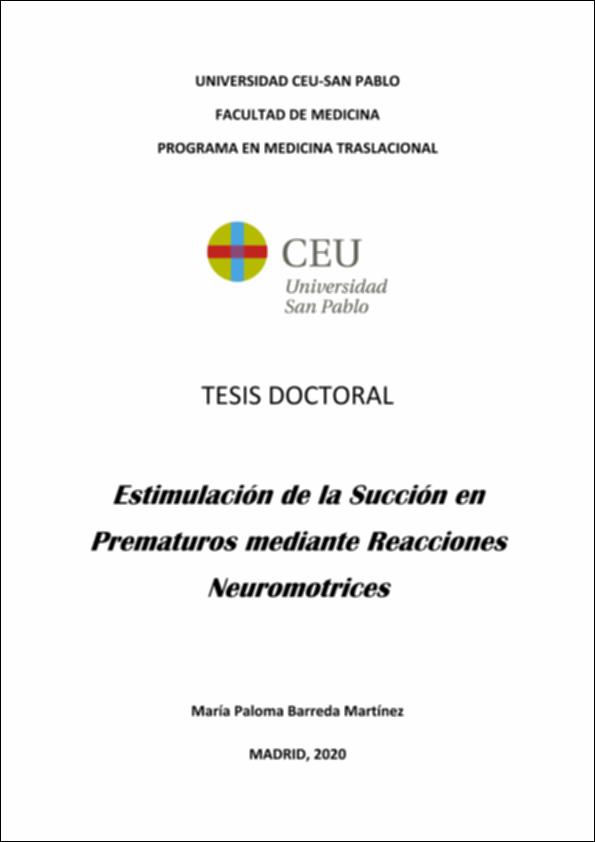Please use this identifier to cite or link to this item:
http://hdl.handle.net/10637/12822Estimulación de la succión en prematuros mediante reacciones neuromotrices.
| Title: | Estimulación de la succión en prematuros mediante reacciones neuromotrices. |
| Authors : | Barreda Martínez, Paloma |
| Keywords: | Fisioterapia.; Prematuro.; Succión.; Comportamiento de la succión.; Comportamiento de la alimentación.; Physical Therapy Speciality.; Prematurity.; Suction.; Sucking Behavior.; Feeding Behavior. |
| Abstract: | Introducción: La succión nutritiva es un hito importante para poder alimentarse correctamente el neonato. Aquellos nacidos prematuros no tienen desarrollada esta habilidad por lo que se han diseñado diferentes formas para estimular su aparición.
Objetivo: Comprobar si la estimulación de los reflejos orales innatos, a través de las reacciones neuromotrices disminuyen el tiempo para adquirir la succión nutritiva.
Pacientes y métodos: Se estudiaron neonatos nacidos antes de la 34 semana de gestación y alimentados mediante sonda por succión ineficaz. El grupo control estuvo constituido por los recién nacidos con las mismas características nacidos durante el año 2016. El grupo experimental fue estimulado mediante las reacciones neuromotrices hasta la retirada de la sonda. Las variables observadas fueron el tiempo de transición a la alimentación oral completa, peso, talla y perímetro craneal al alta, saturación periférica de oxígeno y frecuencia cardiaca antes y después de la intervención, así como la calidad de la succión mediante la escala ECLES.
Resultados: Un total de 23 bebés completaron el estudio en el grupo de intervención y 25 en el grupo de control histórico. Los niños del grupo intervenido mostraron una transición acelerada a la alimentación oral independiente y valores más elevados de altura (p=.01), peso (p<.001) y perímetro craneal (p=.04) en el momento del alta hospitalaria.
La edad gestacional al alta y la duración total de la hospitalización no mostraron diferencias entre grupos (p>.05).
Conclusiones: La estimulación mediante las reacciones neuromotrices disminuye el tiempo necesario para alcanzar la succión nutritiva en los pretérmino. Introduction: Nutritive suction is an important milestone in order to feed the newborn correctly. Premature infants have not developed this ability so they have designed different ways to stimulate their occurrence. Objective: To assess whether the stimulation of the innate oral reflexes, through the neuromotor reactions reduces the time to acquire the nutritive suction. Patients and methods: We studied newborn before 34 weeks of gestation and fed by tube feeding due to an ineffective suction. The control group consisted of newborns with the same characteristics born during the year 2016. The experimental group was stimulated by neuromotor reactions until the tube feeding was stopped. The variables observed were the transition time to complete oral feeding, weight, height and cranial perimeter at discharge, peripheral oxygen saturation and heart rate before and after the intervention, as well as the quality of the suction using the ECLES scale. Results: A total of 23 babies completed the study in the intervention group and 25 in the historical control group. The children in the intervention group showed an accelerated transition to independent oral feeding and higher values of height (p=.01), weight (p<.001) and cranial perimeter (p=.04) at the time of hospital discharge. The gestational age at discharge and the total duration of hospitalization did not show differences between groups (p>.05). Conclusions: The oral stimulation intervention by means of neuromotor reactions reduced the time necessary to reach the nutritional suction in the preterm ones. |
| Description: | Tesis-CEINDO, Universidad San Pablo CEU, Programa en Medicina Traslacional, leida el 8 de octubre de 2020 |
| Director(s): | Romera Modamio, Gerardo |
| URI: | http://hdl.handle.net/10637/12822 |
| Rights : | http://creativecommons.org/licenses/by-nc-nd/4.0/deed.es |
| Issue Date: | 25-Jun-2021 |
| Center : | Universidad San Pablo-CEU |
| Appears in Collections: | Medicina Traslacional |
Items in DSpace are protected by copyright, with all rights reserved, unless otherwise indicated.


